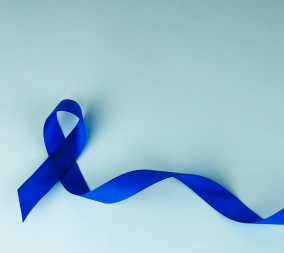March is colorectal cancer (CRC) awareness month. While this is not a gynecological malignancy, your doctors and nurse practitioners at Kamm Mckenzie work with you during your health maintenance visits to make you aware of screening. The purpose of screening is to find or remove polyps before they become cancer, or to find cancer as early as possible. Studies show that having colorectal cancer screening lowers the chance of dying from this cancer. There are several different screening options for CRC, but for the purposes of this blog, I want to focus on the two for which we most typically order or refer.
Colonoscopy
Colonoscopy is the “gold standard” for CRC screening. You are referred to see a gastroenterologist who orders a prescription liquid to cause watery diarrhea for several hours the day before your procedure in order to clean out your colon. Of note, there are much more tolerable bowel preparation options now than ever before, so this should not be a big deterrent to getting a colonoscopy. On the day of your procedure you get anesthesia to help you relax/sleep. The doctor then inserts a long tube with a camera on the tip into your anus so that he/she can see into your colon. There are small holes where the doctor can insert instruments and remove polyps or take biopsies.
Stool DNA/Blood Test
At the time of writing this blog, we can order a test with the brand name Cologuard for those at average or low risk of CRC. After discussion with your doctor or nurse practitioner, we can order this for you. It is an at home stool collection that checks for genetic DNA markers of cancer or precancerous polyps, as well as for signs of blood. If ordered, you get a special kit in the mail in order to collect an entire bowel movement. Then there are a few easy to follow instructions on packaging it up and shipping it back. (Pretty wild huh? I bet you never thought you’d mail your poop!). While not as accurate as a colonoscopy (which I will stress again is the best test), if the test returns abnormal, you will be referred for a colonoscopy.
Timing of screening is based on your individual risk. For those who are low to average risk, screening generally starts at 45-50 years old, depending on which professional organization’s guidelines you look at. If you are low or average risk and choose to get a colonoscopy and it is totally normal, then you generally only need one every 10 years. The gastroenterologist may recommend more frequent testing based on the findings or your individual risk. For example, for the most common polyp findings, a repeat colonoscopy is usually recommended in 3 to 5 years. If you get the Cologuard test and it is totally normal, you repeat this every 3 years. Remember as mentioned above, if the Cologuard is abnormal, you definitely need a colonoscopy.
Higher risk individuals, such as those with a family history of CRC or who themselves have inflammatory bowel disease (Chrohn’s or ulcerative colitis) will likely need much earlier and more frequent screening. Higher risk patients should establish care with a gastroenterologist who can help with a screening program and should expect colonoscopy over other screening options.


















